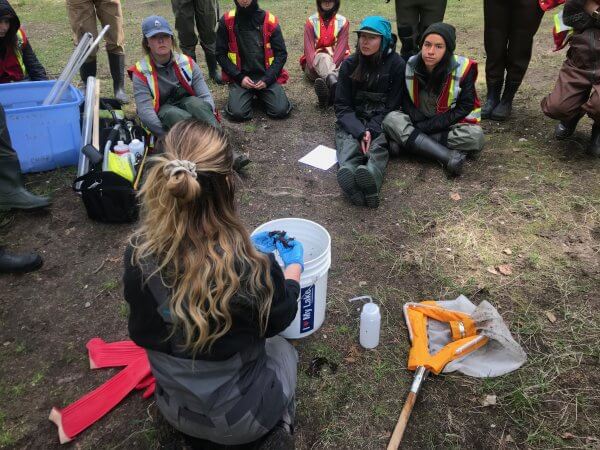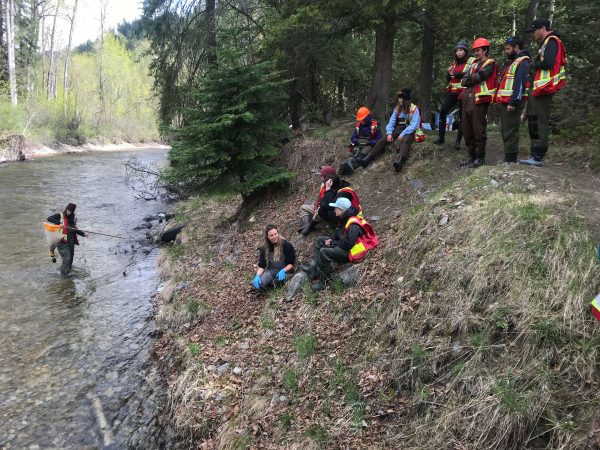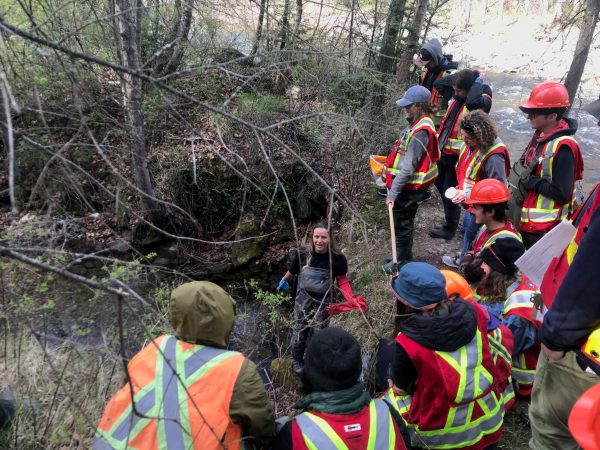B.C. students get their feet wet at a DNA metabarcoding demo
By Raegan Mallison, Living Lakes Canada Program Manager
A group of students who recently completed their first year in Selkirk College’s Integrated Environmental Planning Program attended a riverbed sample collection for DNA metabarcoding at Pass Creek, outside of Castlegar, B.C. last weekend (April 27-28).
The Living Lakes Canada demonstration was a taste of what is to come this fall when the students, as part of the program, will be certified in the Canadian Aquatic Biomonitoring Network (CABiN) field practicum.
Living Lakes Canada has been training water stewardship communities, government, industry, academia and First Nation communities in the CABiN protocol for the last 6 years; and using the CABiN protocol for stream water monitoring efforts over the last decade. The CABiN protocol is a standardized method for collecting benthic invertebrates — the small animals on the bottom of the stream that are indicative of the water quality — to provide stream health assessments.
Selkirk College, with guidance and training from Living Lakes Canada and Environment and Climate Change Canada, has been able to integrate this certification through the Integrated Environmental Planning Program.

During the demonstration, students were able to participate in the collection of the benthics in Pass Creek and learned about the new updated technology for the analysis of the benthics using DNA metabarcoding, which is a combination of DNA identification and automated DNA sequencing to generate biodiversity data for freshwater benthic macroinvertebrates. Changes in the makeup of these invertebrate communities can be excellent indicators of pollution and other environmental stressors.
Compared to current monitoring methods, which can be slow and costly, DNA metabarcoding technology has the potential to produce biodiversity data more quickly, more affordably and at a higher resolution. The results of DNA-based biomonitoring will support better environmental assessment, planning and regulatory decisions, which is essential as population growth, agricultural activity, resource development and climate change all put increasing pressure on Canada’s freshwater ecosystems.
The new partnership between Living Lakes Canada, World Wildlife Fund Canada, Environment and Climate Change Canada (ECCC) and Dr. Mehrdad Hajibabaei of the University of Guelph, with funding from Genome Canada, will bring this new DNA metabarcoding technology to Canadian communities. Called Sequencing the Rivers for Environmental Assessment and Monitoring (STREAM), this project will pair the power of DNA metabarcodingtechnology with community groups across the country to allow for faster sample analysis of benthic invertebrate data that can be collected year-round while developing a national citizen science program.
As one of the groups participating in this national project, Selkirk College students will learn the CABiN techniques through collecting real samples for real analysis by the University of Guelph. These fall samples will be compared to the samples collected so far this spring to begin establishing baseline data and potential for seasonal variability.
If you are interested in taking part in the STREAM project and submitting benthic samples free of charge to the University of Guelph, and/or receiving CABiN training to learn methods for stream health assessments, please contact Living Lakes Canada Operations Manager Raegan Mallinson at raegan@livinglakescanada.ca.
To learn more about DNA metabarcoding and STREAM, visit https://livinglakescanada.ca/new-edna-project-stream-launching-summer-2019/.







